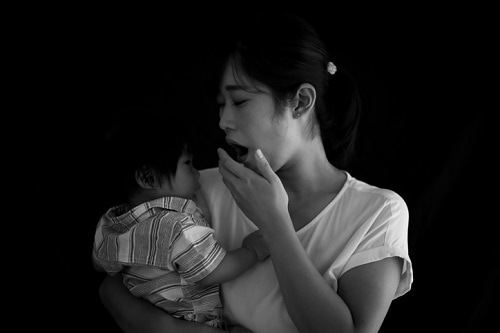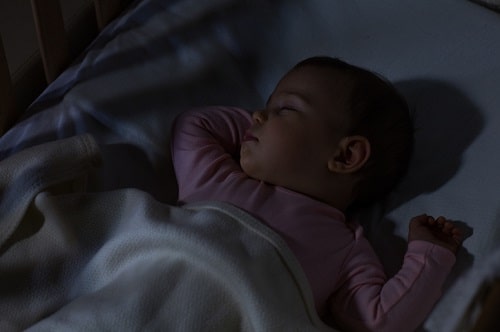Advice
When do babies sleep through the night?

Studies suggest that most babies begin to “sleep through the night” (at least 5-6 hours without parental intervention) by 3-6 months of age. But some infants take longer, and the road to progress can be bumpy. Even after babies experience their first, long episodes of nighttime sleep, they may follow an irregular pattern — sleeping through the night occasionally, but not consistently.

“When will my baby begin to sleep through the night?“
This is one of the most common questions that new parents ask.
Unfortunately, answers can be tricky, and it’s not just because every baby is different. The very concept of “sleeping through the night” is problematic.
Why? Because nobody truly “sleeps through the night.”
Not if by “sleeps through the night” we mean something like “being continuously unconscious the entire time.”
As I explain in my article about night wakings, the brain engages in frequent shifts between different stages of sleep. And all of us experience numerous episodes of waking or near-waking during the night.
If we feel otherwise — if we awaken in the morning convinced that we slept continuously (“like a log”) — it’s simply because we don’t remember these brief interruptions.
And babies? Sleep scientists have monitored infant sleep, using electrodes, actigraphs, and continuous video and audio recordings. They’ve confirmed that babies, too, experience many arousals and awakenings at night.
For example, in a study using actigraphs, researchers found that 6-month-old babies didn’t sleep continuously for more than about 72 minutes at stretch (Sher et al 2004).
So if we interpret “sleeping through the night” as “sleeping non-stop,” this isn’t something that healthy humans do.
But what if we interpret “sleep through the night” in a different way? To mean something less ambitious?
At what age do babies experience peaceful, consolidated bouts of sleep lasting at least 5-6 hours?
By “peaceful” and “consolidated” I don’t mean that the baby never arouses or awakens. As we’ve seen, that isn’t realistic. Instead, the idea is that the baby handles night wakings on his or her own. When the inevitable sleep interruption happens, the baby goes back to sleep — quickly and quietly — without waking up caregivers.
If that’s what we mean by “sleeping through the night,” then studies indicate that some parents are experiencing relief by 3 months. And based on studies conducted in Western countries, most parents report that their 6 month-old babies are capable of sleeping at least 5-6 hours at a stretch.
For instance, in a study of approximately 100 families in the United Kingdom, researchers measured infant sleep in two ways: (1) by monitoring babies throughout the night with video cameras; and (2) by asking parents to keep written sleep diaries (St James-Roberts et al 2015).
The video recordings told a clear story of progress over time.
When babies were just 5 weeks old, the average duration of visibly uninterrupted sleep was about 2 hours. By 3 months, this average duration had jumped to 3.5 hours.
But the more impressive numbers came from the parent’s sleep diaries: 67% of parents claimed that their 3-month-old babies were sleeping continuously for 5 hours or more!
Why the discrepancy? The video recordings leave us no doubt. Some parents were simply unaware that their infants had awakened. The night wakings had been brief, and the babies had remained quiet. The babies had re-settled themselves back to sleep — without awakening their parents.
It’s a happy circumstance, and other research suggests it’s pretty commonplace. At least, that seems to be the case in English-speaking countries.
For example, researchers in New Zealand recruited 75 families with babies under the age of 1 month. Then, every month, they asked parents to document a single night of their babies’ sleep behavior (Henderson et al 2010).
The result was a month-by-month snapshot of each baby’s sleep development, and researchers found evidence for improvements around 3-4 months.
When babies were 2 months old, only 6 of them — 8% — experienced a night of sleeping for 5 consecutive hours between midnight and 5am.
But by the time babies were 3 months old, this number had jumped to 30 babies — 40% of the total. And by 4 months? Just over 50% of the infants had slept between midnight and 5 am.
Fast forward to 6 months, and even more parents were reporting long, nighttime sleep intervals. Nearly 70% said their babies slept between midnight and 5am.
Other studies — representing the experiences of thousands of families in Australia, Canada, and the United States — report similar trends. When parents are asked to keep sleep diaries, or to simply recollect how long their babies have slept in a given night, most report that their babies have slept for intervals of at least 5 hours by the time they are 3-5 months old (Sadeh et al 2009; Teng et al 2012).
What about sleeping for even longer stretches of time without parental intervention? When do babies sleep for 7-8 hours at a time?
In the survey of New Zealand parents, most (52%) said their 6-month-old babies had slept for 8 hours — staying quiet between 10pm and 6 am.
And in a large study of more than 5,000 families in the United States and Canada, researchers found that the longest sleep episode for babies 6-8 months old ranged between 5 and 10 hours, with the average episode lasting approximately 7 and a half hours (Sadeh et al 2009).
Does this mean that you can expect that your baby will be “sleeping through the night” by 6 months?


No. There are a couple of big caveats to keep in mind.
Caveat #1: There’s a considerable amount of variation between individuals.
Sure, most babies might be “sleeping through the night” by 6 months. But we’re still left with a lot of babies who aren’t.
For instance, in a survey of more than 380 Canadian parents, 62% said their 6-month-old babies were sleeping uninterrupted for 6 hours each night.
But 38% said their babies were sleeping for shorter stretches of time (Pennestri et al 2018).
And let’s take another look at the New Zealand study — the one that asked parents to document a single night of their babies’ sleep behavior, one night per month.
At the 9 month checkpoint, approximately 25% of parents were in this category.
And by the end of the study — at 12 months — 16% of parents reported that their babies had failed to stay asleep between midnight and 5 a.m..
That’s a lot of older babies who weren’t sleeping during the midnight-to-5 a.m. interval. At least not on the particular night in which their parents kept a sleep diary.
And that brings me to the second caveat.
Caveat #2: The same infant may experience a lot of variation from one night to the next.
Even if you’ve experienced an episode of “sleeping through the night,” that doesn’t mean your baby will keep doing it reliably — night after night.
On the contrary, it may be normal for young babies to go back and forth — experiencing longer sleep bouts on some nights, and shorter sleep bouts on others.
In a study of 6-month-old babies in Canada, Marie-Hélène Pennestri and her colleagues demonstrated this point. They asked parents to keep records of their babies’ sleep behavior — not just for one night, but for 13 consecutive nights. And this longer-term approach revealed something very interesting.
Most parents reported that their babies slept for a 6-hour stretch at least once. In fact, 50% of the babies experienced at least one night of sleeping for 8 hours or more.
But most babies weren’t sleeping this way habitually. It was an occasional thing.
For example, take the criterion of sleeping for 6 hours without parental intervention. Of the 44 infants participating in this study, only three babies did this for all 13 nights.
And the criterion of sleeping for 8 hours without parental intervention? Just one baby managed to do that across all 13 nights.
The more normal pattern was to be…irregular. As the researchers explain:
And it’s worth pointing out: Nine of the babies never slept for 6 hours consecutively. And 22 babies — 50% of the total — never slept for 8 hours consecutively (Pennestri et al 2020).
What about sleep regression? Can babies experience abrupt reversals — going from sleeping soundly at night, to re-experiencing multiple night wakings?
Yes. It’s not unusual for babies to experience temporay setbacks in their sleep patterns, especially around the time that an infant is learning an exciting new motor skill (Sher and Cohen 2012; DeMasi et al 2023).
Is it true that breastfed babies awaken more frequently during the night?
Many studies — conducted in both Eastern and Western countries — report links between breastfeeding and more frequent night wakings (e.g., Ramamurthy et al 2012; Abdul Jafar et al 2021; Manková et al 2023). So if you are breastfeeding, you might expect that it will take longer for your baby to reach the milestone of sleeping through the night.
However, it’s worth noting: This same research suggests that breastfed babies get just as much total sleep at night as formula fed babies, if not more. And mothers who breastfeed might actually experience more nighttime sleep than do mothers who use formula (Srimoragot et al 2023). In a study tracking more than 4,000 infants through the age of 24 months, babies who were fully breastfed for the first 3 months postpartum tended to experience better sleep trajectories throughout infancy — obtaining more sleep overall (Wang et al 2023).
Moreover, when researchers dug deeper into the data, they found that breastfeeding by itself wasn’t associated with more frequent night wakings. Instead, the key factor was whether parents nursed their babies back to sleep (as opposed to returning them to bed while they are drowsy, but still awake). When researchers controlled for this factor, there was no statistically significant difference between breastfeeding and bottefeeding (Ramamurthy et al 2012).
Are there cultural differences?
Large studies contrasting East Asian and Western countries have documented a consistent regional difference: Parents in East Asian countries tend to report shorter times for an infant’s longest nighttime sleep episode (Mindell, Sadeh, and Kohyama et al 2010; Mindell, Sadeh, and Weigand et al 2010).
Researchers note that this difference of outcome is linked to a difference in bedtime practices. East Asian parents are more likely to be present when their babies fall asleep at bedtime, and parental presence at sleep onset is linked with shorter nighttime sleep bouts (Mindell, Sadeh, and Weigand et al 2010).
There is also evidence that room-sharing is linked with shorter nighttime sleep episodes.
For example, a study in Israel tracked approximately 140 families with young infants. Infant sleep was measured with both actigraphs and parental sleep diaries. The longest sleep episode tended to be shorter among babies who shared a bedroom with their parents (Volkovich et al 2018)
Okay. So it’s important to understand that there’s a lot of variability. But is there anything parents can do to encourage babies to sleep through the night?


Yes!
Newborn babies need to awaken frequently to feed. So we can’t expect them to sleep for 5-6 hours at a time.
But there are still steps parents can take — from the very beginning — to help their infants develop mature sleeping patterns. Here are some evidence-based tips.
Tip #1: It’s useful to understand the biology of infant sleep, and to provide babies with the environmental support they need to get their circadian rhythms in sync with the natural cycle of day and night.
This includes exposing babies to activity and bright light during the daytime. It also includes avoiding bright lights and excitement during the evening. See this Parenting Science article for details.
Tip #2: Try to maintain a consistently dark bedroom throughout the night.
It may be tempting to switch on the lights during nighttime caregiving…or maybe your sharing a room with your baby, and you want to keep the lights on before you fall asleep yourself. Either way, there’s some reason to reconsider these practices.
As noted in Tip #1, bright lights at night can interfere with your baby’s developing circadian rhythms. And there’s also circumstantial evidence that such light exposure shortens the time that babies spend sleeping at night. For example, in one study, babies who were kept in consistent darkness slept, on average, about 28 minutes longer each night (Quante et al 2022
-

 Destination8 months ago
Destination8 months agoSingapore Airlines CEO set to join board of Air India, BA News, BA
-

 Breaking News10 months ago
Breaking News10 months agoCroatia to reintroduce compulsory military draft as regional tensions soar
-

 Gadgets3 months ago
Gadgets3 months agoSupernatural Season 16 Revival News, Cast, Plot and Release Date
-

 Tech News12 months ago
Tech News12 months agoBangladeshi police agents accused of selling citizens’ personal information on Telegram
-

 Productivity11 months ago
Productivity11 months agoHow Your Contact Center Can Become A Customer Engagement Center
-

 Gadgets3 weeks ago
Gadgets3 weeks agoFallout Season 2 Potential Release Date, Cast, Plot and News
-

 Breaking News10 months ago
Breaking News10 months agoBangladesh crisis: Refaat Ahmed sworn in as Bangladesh’s new chief justice
-

 Toys12 months ago
Toys12 months ago15 of the Best Trike & Tricycles Mums Recommend























